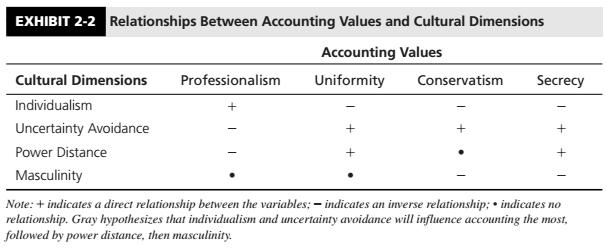Read the examples below and answer the following questions for each example. Use the table below to help relate the identified cultural dimension to accounting
Read the examples below and answer the following questions for each example. Use the table below to help relate the identified cultural dimension to accounting values:
- What cultural dimension is being described?
- Does this example rank high or low on this cultural dimension?
- How would this cultural dimension affect their accounting practices/values (“Gray’s Values”)?
Example 1
Many Fortune 500 firms in the United States have an “open door policy” allowing employees, whether it is their first day or they were recently promoted to CEO, to voice their opinions on the structure and vision of the company. Everyone is encouraged to share his or her innovative ideas with the promise that their voice will be heard. Furthermore, managers are expected to have their doors open at all times to allow for greater communication. It is very common for employees to address their direct superiors by their first name or nickname, ignoring titles.
Example 2
Bosch, a large private German firm, is in the process of implementing a new bonus evaluation system with all their subsidiaries around the globe. Their evaluation scheme requires managers of all teams to rank their members from highest to lowest in terms of performance—this is required of all teams, even the top performing teams. While they had no problems implementing this program in their U.S. subsidiaries, it failed to be implemented in their Chinese subsidiaries who simply refused to complete the forms. Their culture is built on a very tight-knit social framework in which employees can expect the members of a particular in-group to look after them in exchange for unquestioning loyalty.
Example 3
Northern European countries (e.g. Norway, Sweden, Denmark, Netherlands) are known for their high quality of life. They value cooperation, caring and providing for the less fortunate, and modesty:
American applicants, to Dutch eyes, oversell themselves. Their CVs are worded in superlatives…during the interview they try to behave assertively, promising things they are very unlikely to realize…Dutch applicants in American eyes undersell themselves. They write modest and usually short CVs, counting on the interviewer to find out by asking how good they really are…they are very careful not to be seen as bragging and not to make promises they are not absolutely sure they can fulfill. American interviewers know how to interpret American CVs and interviews and they tend to discount the information provided. Dutch interviewers, accustomed to Dutch applicants, tend to upgrade the information. To an uninitiated American interviewer an uninitiated Dutch applicant comes across as a sucker. To an uninitiated Dutch interviewer an uninitiated American applicant comes across as a braggart.
EXHIBIT 2-2 Relationships Between Accounting Values and Cultural Dimensions Accounting Values Cultural Dimensions Professionalism Uniformity Conservatism Secrecy Individualism + Uncertainty Avoidance Power Distance Masculinity Note: + indicates a direct relationship between the variables; - indicates an inverse relationship; indicates no relationship. Gray hypothesizes that individualism and uncertainty avoidance will influence accounting the most. followed by power distance, then masculinity.
Step by Step Solution
3.53 Rating (156 Votes )
There are 3 Steps involved in it
Step: 1
1 cultural dimension The original theory proposed four dimensions along which cultural values could ...
See step-by-step solutions with expert insights and AI powered tools for academic success
Step: 2

Step: 3

Ace Your Homework with AI
Get the answers you need in no time with our AI-driven, step-by-step assistance
Get Started


